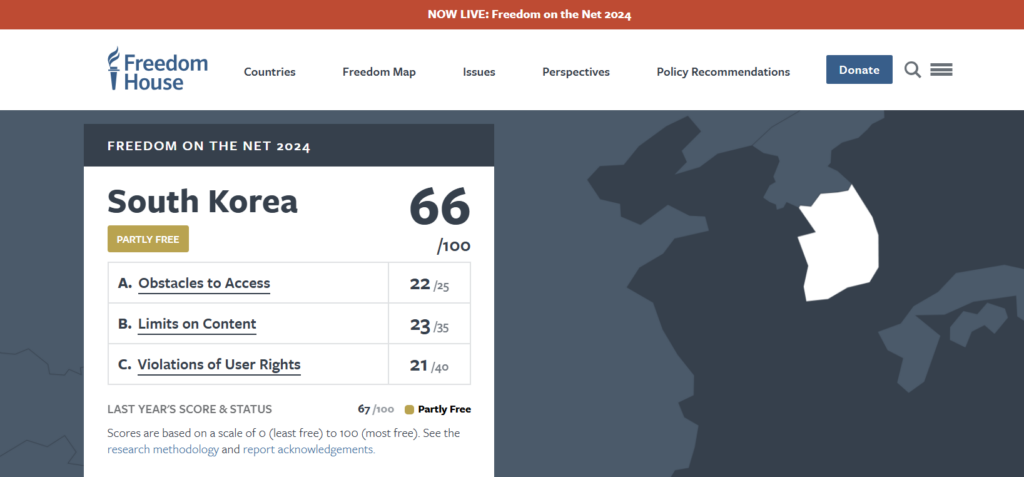Please read the Korean original here.
On June 3, Mr. Kim was sentenced to one year in prison by the Seoul District Court for libeling the Coast Guards when he uploaded a photo of an alleged message between rescue divers that read, “The one in charge of the Sewol Ferry site is preventing the search for the missing bodies”.
Although the government floundered with great difficulty during the rescue operation, they seem to work swiftly and firmly on punishing citizens, stripping their right to freedom of expression.
Open Net expresses concerns for reasons listed below, especially for those who are under criminal prosecution for criticizing the government in hopes of a faster rescue mission, and offers to provide legal aid to those under investigation or in trial for the supposed libeling of government officials.
1.Strong regulation on “False information” has been used as an oppression tool to sustain the regime.
Just because something is ‘false’, does not mean should be regulated. Only actions that cause damage like libel or fraud can be the subject of such regulation. Even if a statement is false, it can help uncover the truth in the marketplace of ideas. Strict regulation can have chilling effect on statements that are true or close to the truth.
Charges for spreading false information are used in many authoritarian countries to sustain the regime by regulating constructive criticism. One good example is the emergency measure 1 during the Yushin regime. Furthermore, the Constitutional Court ruled what is referred to as the ‘Minerva act’ unconstitutional. The decision seems to be focusing on the principle of legal certainty declaring “public interest” to be a vague expression, but it is implied that simply spreading the false information without clear and present danger of public interest is not enough for criminal punishment.
2. Government should withdraw their swords from “false information” and stop the talk on the Defamation of Character.
In respect of the Sewol incident, South Korean authorities have issued immediate investigation and arrest for publishers, charging them with libel for having uploaded criticisms against the maritime police or government officials. The main examples of such arrests include Gahae Hong, who was arrested for claiming that the maritime police was delaying the rescue mission on the news media, and Mr. Kim, who uploaded the phone message.
However, such actions did not cause any interference with the maritime police’s rescue operation at the time. In fact, when Mr. Kim uploaded the post on April 16th, the maritime police had been trying to delay or disturb the civilian divers. In such circumstances their statement cannot be considered as libel because they did not defame the maritime police or the government officials with malicious intent or carelessness.
The Constitutional Court agreed with the Supreme Court which has already ruled that, “the government agencies cannot be the subjects of libel, and unless the criticism is a reckless attack or an attack with malicious intent, is not immediately seen as libel against government officials.”
Given these conditions, Gahye Hong and Mr. Kim cannot be charged for libel against the government agencies, for punishing them would be the same as the defamation during the Yushin generation with only a different title.
3.The act against spreading false rumors proposed by assemblyman Sunkyo Han is unconstitutional.
Han proposed an amendment of act on promotion of information and communications network utilization and information protection to sentence anyone reporting false information about the government policies on the news media, Internet, or social network services (SNS) during a state of national disaster, financial crisis, or emergency rescue operations, imprisonment of no more than 5 years or fine not exceeding $50,000. For a state to punish a citizen for his or her expression it must be clear which sort of expression is punishable and such expression is violating the legal interest. Similar to the “Minerva act,” assemblyman Han’s proposal is unconstitutional because it is unclear in which kind of expression the act is punishing and what legal interest the act is protecting.
4.Freedom to suggest reasonable doubt on the Internet should be allowed.
Defamation against the Sewol incident victims or the relatives must be strictly punished under the criminal law. However, Open Net is concerned about the suppression of freedom of expression on the Internet and all the attempts taken to shut off all criticisms against the government agencies and officials using the policy of ‘banning rumors’. If freedom of expression was more evidently guaranteed and prosecution against corruption was easier, such an unfortunate incident could have been prevented. Relatives of the victims testify that if the press had freely reported about the rescue plan earlier, the quality of the operation would have been different. Too strict of a regulation on the criticisms about the government and corporations will only lead to a second disaster.
Open Net will provide legal aid to victims under investigation or trial for having supposedly libeling the government officials and authorities about the Sewol rescue mission, and will do its best to improve unfair policies and laws that oppress the freedom of expression on the Internet.
![[Right to Know Infringement Task Force][Parliamentary Forum] Yoon Seok-yeol government’s Attempt to Legalize Information Concealment: Issues and Tasks of the Revision of the Officla Information Disclosure Act](https://www.opennet.or.kr/wp-content/uploads/2024/11/정보공개법-토론회2-1024x684.jpg)

0 Comments